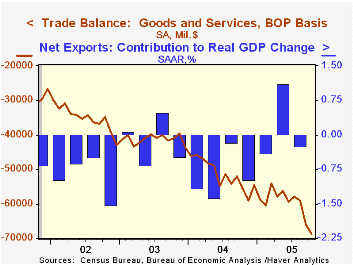 Global| Dec 14 2005
Global| Dec 14 2005U.S. Trade Deficit Widened Unexpectedly
by:Tom Moeller
|in:Economy in Brief
Summary
The October U.S. foreign trade deficit widened to a record $68.9B from a little revised $66.0B in September. Consensus expectations had been for a narrowing to $62.5B. In the wake of Hurricanes Katrina & Rita imports of petroleum [...]

The October U.S. foreign trade deficit widened to a record $68.9B from a little revised $66.0B in September. Consensus expectations had been for a narrowing to $62.5B.
In the wake of Hurricanes Katrina & Rita imports of petroleum products, notably gasoline, surged 23.3% on top of a 27.9% September jump to a level nearly double last October's and up nearly four-fold from the 2003 monthly average.
That spike lifted overall imports by 2.7% for the second consecutive month, despite a decline in crude oil prices to $56.29 per bbl. and petroleum prices overall that were roughly flat m/m.
Imports of nonauto consumer goods were strong as well and posted a 1.2% rise (9.7% y/y), goosed additionally by a 3.9% (7.0% y/y) rise in automotive imports. Capital goods imports fell 0.3% (+7.8% y/y) but imports of advanced technology products jumped 4.9% (NSA, 7.7% y/y).
Total exports gained back most of the prior month's 2.4% collapse with a 1.7% jump. Capital goods exports rose 6.2% (9.8% y/y) with the end of the four-week strike at Boeing Co. that drove exports of civilian aircraft up nearly three-fold m/m (33.1% y/y). Exports of advanced technology products also rose a strong 10.4% (NSA, 6.6% y/y). Exports of capital goods overall rose a strong 6.2% (9.8% y/y) although consumer goods exports fell 5.6% (+5.8% y/y).
Services exports were about flat m/m (+10.4% y/y) as private travel fell 1.8% (+12.5% y/y) though "other" private transportation services rose 1.2% (14.3% y/y).
The US trade deficit with China widened to another record of $20.5B ($161.9B in 2004) due to imports which jumped 4.8% (NSA, 23.9% y/y) though exports surged as well by 22.2% (NSA, 32.7% y/y). The US trade deficit with Japan deepened sharply m/m to $7.4B ($75.6B in 2004) due to a 12.6% (NSA, 6.9% y/y) surge in imports and the monthly trade deficit with the Asian NICs deepened to $1.6B ($21.9B in 2004). The deficit with the European Union deepened sharply to $12.1B ($109.3B in 2004) due to a 13.0% (14.5% y/y) jump in imports.
| Foreign Trade | Oct | Sept | Y/Y | 2004 | 2003 | 2002 |
|---|---|---|---|---|---|---|
| Trade Deficit | $68.9B | $66.0B | $55.6B (10/04) | $617.6B | $494.8B | $421.2B |
| Exports - Goods & Services | 1.7% | -2.4% | 9.2% | 12.6% | 4.6% | -3.0% |
| Imports - Goods & Services | 2.7% | 2.7% | 14.5% | 16.6% | 8.5% | 2.1% |
Tom Moeller
AuthorMore in Author Profile »Prior to joining Haver Analytics in 2000, Mr. Moeller worked as the Economist at Chancellor Capital Management from 1985 to 1999. There, he developed comprehensive economic forecasts and interpreted economic data for equity and fixed income portfolio managers. Also at Chancellor, Mr. Moeller worked as an equity analyst and was responsible for researching and rating companies in the economically sensitive automobile and housing industries for investment in Chancellor’s equity portfolio. Prior to joining Chancellor, Mr. Moeller was an Economist at Citibank from 1979 to 1984. He also analyzed pricing behavior in the metals industry for the Council on Wage and Price Stability in Washington, D.C. In 1999, Mr. Moeller received the award for most accurate forecast from the Forecasters' Club of New York. From 1990 to 1992 he was President of the New York Association for Business Economists. Mr. Moeller earned an M.B.A. in Finance from Fordham University, where he graduated in 1987. He holds a Bachelor of Arts in Economics from George Washington University.
More Economy in Brief
 Global| Feb 05 2026
Global| Feb 05 2026Charts of the Week: Balanced Policy, Resilient Data and AI Narratives
by:Andrew Cates






